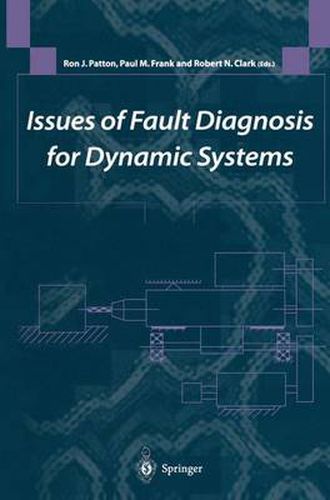Readings Newsletter
Become a Readings Member to make your shopping experience even easier.
Sign in or sign up for free!
You’re not far away from qualifying for FREE standard shipping within Australia
You’ve qualified for FREE standard shipping within Australia
The cart is loading…






This title is printed to order. This book may have been self-published. If so, we cannot guarantee the quality of the content. In the main most books will have gone through the editing process however some may not. We therefore suggest that you be aware of this before ordering this book. If in doubt check either the author or publisher’s details as we are unable to accept any returns unless they are faulty. Please contact us if you have any questions.
There is an increasing demand for dynamic systems to become safer, more reliable and more economical in operation. This requirement extends beyond the normally accepted safety-critical systems e.g., nuclear reactors, aircraft and many chemical processes, to systems such as autonomous vehicles and some process control systems where the system availability is vital. The field of fault diagnosis for dynamic systems (including fault detection and isolation) has become an important topic of research. Many applications of qualitative and quantitative modelling, statistical processing and neural networks are now being planned and developed in complex engineering systems. Issues of Fault Diagnosis for Dynamic Systems has been prepared by experts in fault detection and isolation (FDI) and fault diagnosis with wide ranging experience.Subjects featured include: - Real plant application studies; - Non-linear observer methods; - Robust approaches to FDI; - The use of parity equations; - Statistical process monitoring; - Qualitative modelling for diagnosis; - Parameter estimation approaches to FDI; - Fault diagnosis for descriptor systems; - FDI in inertial navigation; - Stuctured approaches to FDI; - Change detection methods; - Bio-medical studies. Researchers and industrial experts will appreciate the combination of practical issues and mathematical theory with many examples. Control engineers will profit from the application studies.
$9.00 standard shipping within Australia
FREE standard shipping within Australia for orders over $100.00
Express & International shipping calculated at checkout
Stock availability can be subject to change without notice. We recommend calling the shop or contacting our online team to check availability of low stock items. Please see our Shopping Online page for more details.
This title is printed to order. This book may have been self-published. If so, we cannot guarantee the quality of the content. In the main most books will have gone through the editing process however some may not. We therefore suggest that you be aware of this before ordering this book. If in doubt check either the author or publisher’s details as we are unable to accept any returns unless they are faulty. Please contact us if you have any questions.
There is an increasing demand for dynamic systems to become safer, more reliable and more economical in operation. This requirement extends beyond the normally accepted safety-critical systems e.g., nuclear reactors, aircraft and many chemical processes, to systems such as autonomous vehicles and some process control systems where the system availability is vital. The field of fault diagnosis for dynamic systems (including fault detection and isolation) has become an important topic of research. Many applications of qualitative and quantitative modelling, statistical processing and neural networks are now being planned and developed in complex engineering systems. Issues of Fault Diagnosis for Dynamic Systems has been prepared by experts in fault detection and isolation (FDI) and fault diagnosis with wide ranging experience.Subjects featured include: - Real plant application studies; - Non-linear observer methods; - Robust approaches to FDI; - The use of parity equations; - Statistical process monitoring; - Qualitative modelling for diagnosis; - Parameter estimation approaches to FDI; - Fault diagnosis for descriptor systems; - FDI in inertial navigation; - Stuctured approaches to FDI; - Change detection methods; - Bio-medical studies. Researchers and industrial experts will appreciate the combination of practical issues and mathematical theory with many examples. Control engineers will profit from the application studies.